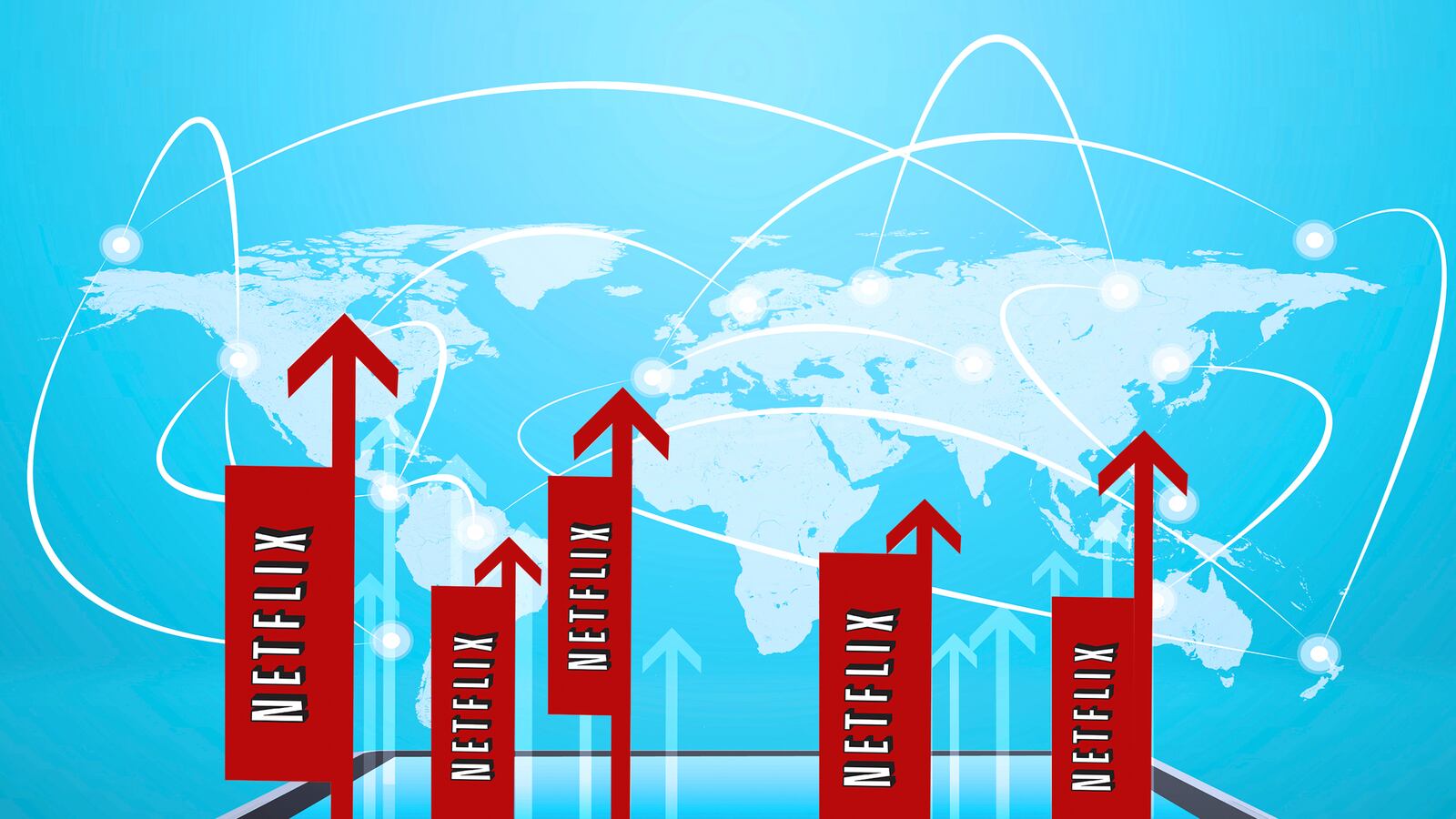So what does it really mean for Netflix to go global?
For globetrotting Americans like me it’s a matter of convenience. Now, if I’m visiting relatives in Taiwan over the holidays and feel like mainlining comfort-food TV rather than making the effort to interact with my family, I can surf directly to Netflix and cue up Orange Is the New Black without going through the rigmarole of a VPN. (Cue Master of None jokes about watching Dexter in India.)
Netflix isn’t doing it for me, though—they’ve already got my subscription fee. They’re doing it for my cousins in Taiwan, who theoretically could be Netflix subscribers already if they wanted to but would have to go through the rigmarole of using a service like a VPN or DNS proxy to trick Netflix into thinking they’re in the United States before they could use it.
It sets up an interesting situation, because in theory Netflix isn’t actually giving people anything they didn’t already have a way to get. VPNs and DNS proxy services are numerous, and don’t require much technical skill to use. They’re arguably technically illegal—New Zealand ISPs are currently embroiled in a legal battle over how illegal they are—but that doesn’t stop anyone from using them. Media superfans abroad who really, desperately want to see Making a Murderer or Jessica Jones have already seen it.
Indeed, all Netflix is doing is lifting a restriction that they instituted in the first place. From a technical perspective, streaming Jessica Jones over the Web to Auckland, New Zealand, isn’t any more difficult than streaming it to Los Angeles, California. That’s the whole point of the World Wide Web, and of the Internet as a whole: to be a decentralized network where any node in the system can access any other.
Netflix has to take extra steps—steps that cost money and resources—to determine, based on your IP address, what part of the world your computer is in and block you from downloading their content if you’re in the wrong place. This is still the case, even after they’ve “gone global”—Israelis still can’t watch Orange is the New Black, Singaporeans can’t watch House of Cards, and only Canadians get early access to a streaming version of Star Wars: The Force Awakens.
Ironically, for people who were already tech-savvy enough to watch Netflix overseas, Netflix going global will actually make it harder for Israelis to watch Orange is the New Black. Netflix preceded their New Year’s announcement of going global by, over Christmas weekend, quietly taking steps to make VPNs harder to use on their service, presumably to increase the incentive for people to sign up for legitimate overseas Netflix accounts.
In other words, content that was in all practical terms readily available for anyone who knew how to get it will now actually be harder for some people to get.
Enter the tangled legal debate over geoblocking.

Geoblocking is just another one of the many perverse situations created by an analogue marketplace that has yet to catch up to a digital world.
It’s similar to the concept of media piracy. The way we buy books, movies, music and the like used to depend on the idea of media coming in physical forms—bundles of pages, magnetic tapes, vinyl discs—that were costly to replicate.
But give everyone computers that, as a matter of course, make perfect copies of any information they process all the time as part of the inherent nature of processing it, and the system falls apart. You’re reduced to asking people to pretend that the MP3 on their computer, which their computer can make thousands of copies of in seconds, works like a physical vinyl record—or else your whole economy for compensating artists stops working.
It’s a situation that simply feels intrinsically perverse, and can’t be enforced without the creepy situation of giving the corporations that sell you music control over the computer you own. It leads to endless ideological battles over what “owning” information even means in the first place and what the moral obligation to pay for your entertainment really is.
Geoblocking takes it a level beyond that. Back when movies and TV shows came in canisters of film that had to be shipped from place to place, the distribution networks for movies and TV were built up separately, country by country. The rights to sell movies and TV shows were likewise split up in contractual agreements, region by region, country by country, and parceling out those “foreign rights” remains a high-stakes endeavor for people negotiating contracts. Even in the world of book publishing—which has far fewer moving parts than releasing a feature film—the idea of collapsing foreign distribution rights into one set of “global rights” would be a seismic shock to how business is done.
So from the business side of things, the creation of this magical global communications network where someone in Australia can browse the exact same World Wide Web as someone in Hungary is a problem—and creating artificially separated “distribution networks” between the two countries makes perfect sense (even though in reality there’s only one distribution network now, the Internet).
From the customer’s side of things, it’s worse than anti-piracy provisions. At least anti-piracy provisions are about getting you to pay money for something you want to watch. Geoblocking is about preventing you from using the computer you own and the Internet connection you pay for to access a streaming service you also pay for and watch a movie or TV show with all its embedded advertising intact, just because you’re living in the wrong country at the time.

The earlier generation of geoblocking, region-locking on internationally distributed DVDs, sparked a similar customer revolt and an underground trade in region-free DVD players and “Region 0” DVDs that wasn’t so much resolved as mooted once DVDs were eclipsed by streaming services.
It’s an interesting situation. As long as traditional distribution continues to exist alongside Internet distribution, distributors have a legitimate incentive to control the latter—DVD region-locking started because distributors didn’t want the DVD of a Hollywood movie to be available in Europe when that movie was still just opening up in European cinemas.
Similarly, the rights to distribute Orange Is the New Black in Israel are theoretically worth something; if they become worthless because everyone in Israel is streaming Orange is the New Black through a VPN anyway, then the creators have, theoretically, lost money. (How much money they’ve really lost is up for debate, just like the debate over how much revenue artists really lose due to piracy.)
And yet it still seems, at the end of the day, ridiculous to keep people in a country who have money and want to buy something from buying it just because the right middlemen aren’t in place. American customers aren’t going to stand for being told they have to pay to watch the Olympics in Canada because of behind-the-scenes wheeling-and-dealing, not when changing your IP address to a Canadian one takes five minutes’ worth of work.
After all, that was the same commercial logic behind killing Aereo and telling people it’s illegal to hook up a TV tuner to a computer so people can watch over-the-air programming online. Those streaming rights could theoretically be sold later for a lot of money, and from a creator’s perspective Aereo was taking that money out of their pockets. For a customer—like me—who sees this ruling as basically a requirement that I buy an extra set of equipment, a pair of rabbit ears, and a TV tuner to watch Jeopardy! on my computer at 7:30 instead of just doing so online, it’s infuriating.
Netflix hopes to cut the Gordian knot by creating its own content and pushing it out through its own service with no middlemen at all, making shows that are distributed on a “global rights” basis from beginning to end.

I wish them good luck, especially because, just as with getting people to pay for content as opposed to pirating it, getting people to watch Netflix “legitimately” rather than through a VPN is mostly a matter of good will. I have my doubts, though, especially since one of the first reactions to Netflix going global was Americans scrambling to get a VPN service so they can get illicit international goodies like that early-access streaming of The Force Awakens.
As with other digital services, maybe most of them, online streaming exists in a weird limbo where playing by the rules is mostly voluntary. Netflix is still after all banned completely in China, a country with the harshest and scariest restrictions on online content around, and yet tech-savvy Chinese citizens watch Netflix—and browse Facebook and Twitter—all the time, despite the government’s best attempts at playing whack-a-mole with VPN services. It’s not that hard either, if you want, to torrent shows that are too annoying to stream, or to read your favorite websites without giving any money to their advertisers.
Nowadays, content is mostly funded by laziness plus a dollop of guilt; people who find paying the relatively cheap monthly fee for a streaming service easy enough that they give in to doing things the legitimate way (despite the miniscule chance of getting in actual legal trouble). China bothers to keep the Great Firewall up because of the majority of people who don’t care enough to circumvent it.
Netflix is hoping that they’ll get a major influx of regular users worldwide who previously lacked the interest to jump through the hoops necessary to circumvent geoblocking, and that that massive influx will give them enough funding to eventually develop a fully Internet-based distribution model that cuts out those pesky regional distributors once and for all.
What they probably fear is the reverse: that this will just give tech-savvy existing Netflix users worldwide more international content to sift through using the geoblocking circumvention tools they’ve been using all along, pissing off the regional distributors Netflix still has to work with with little net gain to them in the end.
As someone who already does watch content intended for other regions regularly, I’m going to be inconvenienced by Netflix’s crackdown on VPNs more than anything else. But I’ll take that inconvenience if it brings us closer to the day we can leave all this nonsense behind us and have truly border-free media.






